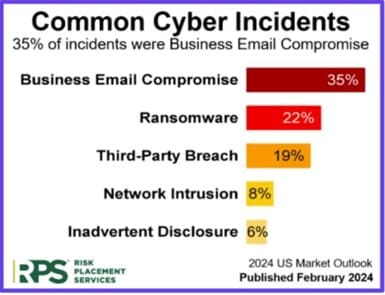Healthcare providers face a unique landscape when it comes to cybersecurity. They are highly regulated by HIPAA and have an obligation to protect sensitive patient information. Technology is also a very important part of how they deliver care to patients. These factors combine to make healthcare a prime target for cyber criminals. The primary attack vector in many cases is your people. There is a bigger need for cybersecurity awareness training in healthcare than ever before.
Dangerous Attacks
A data breach for a healthcare provider can result in a lot more than just data loss. It can impact patient care and safety. If your network is down and you can’t check the medical records software to know what medication to give a patient, it could be life threatening. Giving them medication blind could have unknown interactions.
That’s a single example, but there are endless things that can go wrong if technology was unavailable to healthcare providers.
The Most Common Attack
In 2024 the most common attack according to some recent research by Risk Placement Services is Business Email Compromise or BEC. This is where an attacker will use phishing to compromise an employee’s email, and then take additional infiltration steps from there. Commonly they will try to use social engineering via email to get payments sent to their bank accounts. They can also use that access to get into other things.

In almost every case a BEC attack begins with phishing. They’re preying on the human element. Relying on the idea that people are busy, easily distracted, and gullible. It works. It works well.
What do we do? We need smarter people. Rather, your employees need better training than they’ve had in the past. They also need that training to be specifically about how a cyber criminal may try to trick them or leverage their humanity to gain access. That means they need better training than ever before.
Cybersecurity Awareness Training
There are a few key elements that we think should be part of every cybersecurity awareness training program.
- Realistic Phishing Simulations: These phishing “tests” should mimic actual scenarios they may see and phishing tactics. This helps to prepare healthcare staff on how to identify a potential threat.
- Regular Updates on Emerging Threats: Keeping the curriculum current with cybersecurity trends and threats.
- Engagement and Interactive Learning: Using interactive modules to keep training engaging and memorable.
- Assessment and Feedback: Implementing regular assessments to gauge understanding and provide feedback for improvement.
- Bite Sized: Healthcare providers are busy. Any lengthy or overly complex training typically won’t fit in their day very well. That leads to training either not being done, or it being skimmed through. Best results come from training that is broken into bite sized pieces that easily fit in your day.
Measure Impact
Its important that you have a way to measure how much your staff is learning. The best cyber security awareness training programs will have reporting that gives you good visibility. This allows you to track the progress of your staff, provide remedial training if necessary, and have visibility into the overall success of the training.
Indispensable
Cyber security awareness training has really become a must have for healthcare businesses. It allows you to help protect patient data by educating your biggest asset, your people. Furthermore, it’s become a requirement of many cyber security insurance carriers to even consider issuing a policy. Take the steps today to protect your team by making sure that they have the right trainings and can learn how to spot a threat. You won’t regret it.


